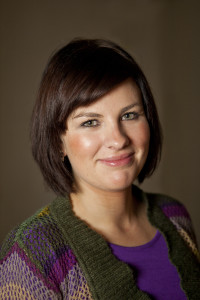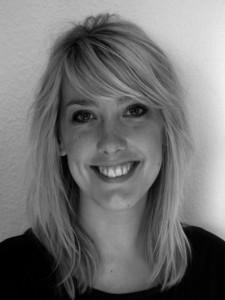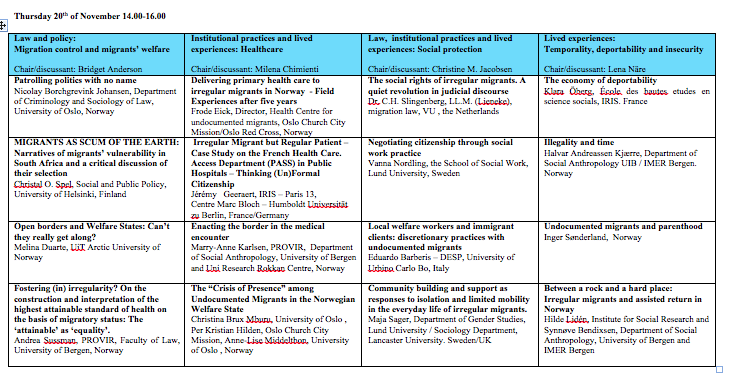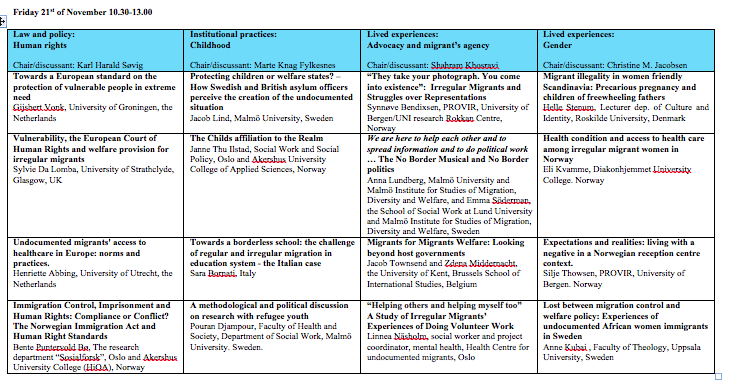Halvar A. Kjærre: “Politics and Mobilities”
Tarje I. Wanvik: “Migration and Social Inequalities”
Halvar A. Kjærre (Department of Social Anthropology, UiB) and Tarje I. Wanvik (Department of Geography, UiB) have recently been recruited to the IMER Bergen research unit as PhD candidates.
In this seminar they will present their PhD projects. After the presentation there will also be a presentation of IMERS new webpages.
IMER Seminar:
Elaine Chase and Jenny Allsopp: The ‘tactics’ of time and status: Young people subject to immigration control making the transition to ‘adulthood’ in the UK
Young people who arrive in the UK from outside Europe without a parent or legal guardian are institutionally categorised according to a range of possible legal statuses and usually afforded time-limited Leave to Remain in the UK. These categorisations are associated with specific welfare entitlements which tend to diminish over time and become particularly uncertain as young people transition into ‘adulthood’. Situated within a broader research programme examining the link between migration, ‘wellbeing’ and ‘futures’, this paper examines the multiple transitions imposed on young people subject to immigration control as they approach the age of 18 and beyond, (from child to ‘adult’, from being accorded a temporary residence permit to more permanent leave to remain or from legality to ‘illegality’) and the implications for their access to various dimensions of welfare provision. The paper shows how different components of the ‘state’ have time limitations at their disposal to control access to welfare and state support according to chronological age. From young people’s perspectives, such ‘tactics’ fundamentally control their trajectories and future prospects unless they can formulate strategies of their own to counter such tactics.
Read more about Elaine Chase here
Read more about Jenny Allsopp here
Katrine Mellingen Bjerke – Elderly migrants in Norway
 Aging of the population raises a series of different challenges for the Norwegian elderly care system. One of the challenges is related to user differentiation, that is, the understanding that services should be adapted to each user’s individual needs. Related to this emphasis on user differentiation is an increasing cultural diversity amongst the elderly population as cohorts of labour migrants and refugees that came in the 1960s and 1970s are facing old age. This necessitates more knowledge about how these elderly migrants perceive of old age, and particularly how they experience and perceive Norwegian care services. This paper addresses how elderly immigrants with a Pakistani and Polish background perceive of aging in Norway, and how they experience and relate to the Norwegian welfare and care regime. What are their expectations? How do they go about covering their assistance needs, both formally (within the public welfare system) and informally (within their family and/or the community).
Aging of the population raises a series of different challenges for the Norwegian elderly care system. One of the challenges is related to user differentiation, that is, the understanding that services should be adapted to each user’s individual needs. Related to this emphasis on user differentiation is an increasing cultural diversity amongst the elderly population as cohorts of labour migrants and refugees that came in the 1960s and 1970s are facing old age. This necessitates more knowledge about how these elderly migrants perceive of old age, and particularly how they experience and perceive Norwegian care services. This paper addresses how elderly immigrants with a Pakistani and Polish background perceive of aging in Norway, and how they experience and relate to the Norwegian welfare and care regime. What are their expectations? How do they go about covering their assistance needs, both formally (within the public welfare system) and informally (within their family and/or the community).
Katrine Mellingen Bjerke
Katrine Mellingen Bjerke is a PhD candidate at the Department of Sociology, at the University of Bergen. She is also associated with IMER Bergen. Her PhD project explores how elderly migrants perceive of the public elderly care services in Norway. Read more about Katrine here
PROVIR closing conference: “Exceptional welfare: Dilemmas in/of irregular migration”
Wednesday 19th of November
Venue: Det Akademiske Kvarter
18.00-19.30: Letter to the king
Film by Hisham Zaman
Letter to the King portrays five people on a day trip from a refugee camp to Oslo, a welcome change in an otherwise monotonous life. But we soon realize that each and every one of them has an agenda for their trip. All five will make decisive choices on this day, as they discover happiness, humiliation, love or fulfill a long-awaited revenge. The five stories are tied together by a letter, written by eighty-three year old Mirza. Mirza wants to hand over the letter to the King personally.
19.30-21.00: Mediating irregular migration
Researchers, artists, authors, journalists and others contribute to the proliferation of images of the lives, and deaths, of those who migrate without proper authorization from the state. While stereotypical accounts of victims/criminals proliferate in mainstream media – (counter) representations that challenge such stereotyping also exist. The speakers in this panel discussion have all participated in producing and/or analysing images of irregular migration. Taking as their point of departure the film “Letter to the King”, they will discuss the poetics and politics of mediating irregular migration. What (im)possibilities does such mediation offer for current border struggles?
Plenary panel discussion with:
Mehmet Aktas, co-producer and scriptwriter, Letter to the king
Shahram Khosravi, Associate Professor of Social Anthropology, University of Stockholm
Synnøve N. Bendixsen, Post-doctoral fellow PROVIR and Department of Social Anthropology, University of Bergen
Film and panel discussion organized in cooperation with Studentersamfunnet i Bergen (http://samfunnet.sib.no/)
Thursday 20th of November
Venue: Faculty of Law, Magnus Lagabøtes plass 1, University of Bergen
09.30-10.00: Tea, coffee and registrations
10.00-10.15: Welcome address
10.15-11.45: Precarious inclusion: Provision of welfare to irregular migrants in Norway
Presentation of PROVIR research findings by
Christine M. Jacobsen, Karl Harald Søvig, Synnøve Bendixsen, Andrea Sussman and Marry-Anne Karlsen
11.45-12.00: Coffee break
12.00-13.00: Care Beyond Welfare?
Key note lecture by Miriam Ticktin, Associate Professor of Anthropology, The New School for Social Research and Eugene Lang College (US)
13.00-14.00: Lunch
14.00-16.00: Workshops
16.00-16.15: Coffee break
16.15-17.15: Wrongs, Rights and Regularization
Key note lecture by Linda Bosniak, Distinguished Professor of Law, Rutgers School of Law–Camden (US)
19.00: Conference dinner
Nøsteboden
Friday 21st of November
Venue: Faculty of Law, Magnus Lagabøtes plass 1, University of Bergen
09.15-10.15: Limiting Health Care as a Tool of Immigration Policy: Ethnographic Insights into Deservingness and Responses by Civil Society
Key note lecture by Heide Castañeda, Associate Professor and Graduate Director, Department of Anthropology, University of South Florida (US)
10.15-10.30: Coffee break
10.30-12.30: Workshops
12.30-13.30: Lunch
13.30-15.30: Excepted, excluded or precariously included? Dilemmas in/of irregular migration
Roundtable discussion by PROVIR research team and international partners:
Bridget Anderson, Professor of Migration and Citizenship and Deputy Director of Centre on Migration, Policy and Society (COMPAS), University of Oxford (UK)
Milena Chimienti, Professor, University of Applied Science Western Switzerland – Social Work, Haute Ecole Fribourgeoise de Travail Social (HETS) (Switzerland)
Henriette Abbing, (Emiratus) Professor of Health Law, University of Utrecht (the Netherlands)
Christine M. Jacobsen, Professor, PROVIR project leader and Director of Center for Women’s and Gender Research (SKOK), University of Bergen (Norway)
Karl Harald Søvig, Professor, Faculty of Law, University of Bergen (Norway)
Workshop Porgram:
Download workshop program here
Film and panel discussion on the dilemmas of mediating irregular migration
Wednesday 19th of November
Venue: Tegleverket, Det Akademiske Kvarter, Bergen
18.00-19.30: Letter to the king
Film by Hisham Zaman
Letter to the King portrays five people on a day trip from a refugee camp to Oslo, a welcome change in an otherwise monotonous life. But we soon realize that each and every one of them has an agenda for their trip. All five will make decisive choices on this day, as they discover happiness, humiliation, love or fulfill a long-awaited revenge. The five stories are tied together by a letter, written by eighty-three year old Mirza. Mirza wants to hand over the letter to the King personally.
19.30-21.00: Mediating irregular migration
Researchers, artists, authors, journalists and others contribute to the proliferation of images of the lives, and deaths, of those who migrate without proper authorization from the state. While stereotypical accounts of victims/criminals proliferate in mainstream media – (counter) representations that challenge such stereotyping also exist. The speakers in this panel discussion have all participated in producing and/or analysing images of irregular migration. Taking as their point of departure the film “Letter to the King”, they will discuss the poetics and politics of mediating irregular migration. What (im)possibilities does such mediation offer for current border struggles?
Plenary panel discussion with:
Mehmet Aktas, co-producer and scriptwriter, Letter to the king
Shahram Khosravi, Associate Professor of Social Anthropology, University of Stockholm
Synnøve N. Bendixsen, Post-doctoral fellow PROVIR and Department of Social Anthropology, University of Bergen
Film and panel discussion is organized by IMER Bergen in cooperation with Studentersamfunnet i Bergen (http://samfunnet.sib.no/) and is part of the PROVIR-project’s closing conference.
Precarious inclusion: Provision of welfare to irregular migrants in Norway
The IMER Bergen-project Provision of welfare to irregular migrants (PROVIR) will present its research findings at this open event.
PROVIR combined legal and anthropological approaches to investigate the complex relationship between law, institutional practice, and irregular migrants’ lived experience. The research project aimed to cast light on living conditions and access to welfare of irregularized migrants.
You can find more information about the project at PROVIRs website: http://rokkan.uni.no/sites/provir/
Date: November 20th
Time: 10.00 to 11.45
Venue: Auditorium 4, Faculty of Law, University of Bergen
IMER seminar in collaboration with Centre on law and social transformation (Note time: 12.15- 14.00)
 For Norway, deporting irregular migrants is currently among the highest political priorities, and never before have so many deportations taken place – with 7100 forced returns an all-time high is expected to be reached in 2014. In this presentation, Janmyr will discuss one of the oldest instruments used by states to control migratory flows – readmission agreements. Such agreements typically assist in overcoming bilateral difficulties by setting out reciprocal obligations on the contracting parties to facilitate the return of persons who do not fulfil the condition of presence in the requested state. This presentation will focus on the objective and substance of Norwegian readmission agreements, and will specifically look into the impact of European Union readmission policies on Norwegian practice. Finally, Janmyr will discuss whether or not these readmission agreements fulfil their objectives: to decrease asylum flows to Norway and to increase both voluntary and forced return.
For Norway, deporting irregular migrants is currently among the highest political priorities, and never before have so many deportations taken place – with 7100 forced returns an all-time high is expected to be reached in 2014. In this presentation, Janmyr will discuss one of the oldest instruments used by states to control migratory flows – readmission agreements. Such agreements typically assist in overcoming bilateral difficulties by setting out reciprocal obligations on the contracting parties to facilitate the return of persons who do not fulfil the condition of presence in the requested state. This presentation will focus on the objective and substance of Norwegian readmission agreements, and will specifically look into the impact of European Union readmission policies on Norwegian practice. Finally, Janmyr will discuss whether or not these readmission agreements fulfil their objectives: to decrease asylum flows to Norway and to increase both voluntary and forced return.
 Maja Janmyr is a researcher at the Faculty of Law at the University of Bergen. Her research focuses on public international law; the interplay between international human rights-, humanitarian-, and refugee law; law and anthropology; international legal method; critical human rights; and socio-legal approaches. Read more about Maja Janmyr here:
Maja Janmyr is a researcher at the Faculty of Law at the University of Bergen. Her research focuses on public international law; the interplay between international human rights-, humanitarian-, and refugee law; law and anthropology; international legal method; critical human rights; and socio-legal approaches. Read more about Maja Janmyr here:
Read more about the Centre on law and social transformation here: www.lawandsocialtransformation.no
Plural policing and the safety–security nexus in urban governance
Based on a study of policy frames in urban politics in Sweden, Malmö in particular, this article discusses the safety–security nexus in urban governance. It argues that perceived safety figures as an index of order and integration, and security becomes part and parcel of an expanded cohesion agenda which chain-links criminal justice, immigration control and civic integration. The expanded cohesion agenda in urban governance involves plural urban policing enabled by partnership agreements between the police and local authorities. The article demonstrates how force-based, pre-emptive crime-fighting is intertwined with preventative empowerment programmes; the ‘will to power’ is embedded in ‘the will to empower’. The preferred solution to social problems is extended force-based policing in combination with more police involvement in ‘social’ governance. It is argued that the expanded social cohesion agenda works to ‘criminalize’ specific subpopulations by replacing ‘social’ welfare politics with crime prevention programmes. Under an expanded cohesion agenda, crime prevention has less to do with preventing people from violating the law and more to do with securing the social order. Moreover, it is argued that security politics relates to a broader urban politics aimed at nurturing prosperous diversity considered to benefit the city as a whole, at the cost of problematic difference. In conclusion the article argues that urban security politics lends itself to old welfare state structures, even as responsibility for social crime prevention is devolved ‘downwards’ and distributed across and array of agencies. The social democratic legacy – the revised welfare state – seems to offer favorable conditions for plural policing of minority groups in the city.
 Randi Gressgård is professor at the Centre for Women’s and Gender Research (SKOK), and affiliated with the research unit International Migration and Ethnic Relations (IMER), University of Bergen. Her research interests include migration & minority studies, gender & sexuality studies and urban studies. Among her recent publications are Multicultural Dialogue: Dilemmas, Paradoxes, Conflicts (New York and Oxford: Berghahn Books, 2010/2012) and ‘The power of (re)attachment in urban strategy: Interrogating the framing of social sustainability in Malmö’ (Environment and Planning A 2014, vol. 46).
Randi Gressgård is professor at the Centre for Women’s and Gender Research (SKOK), and affiliated with the research unit International Migration and Ethnic Relations (IMER), University of Bergen. Her research interests include migration & minority studies, gender & sexuality studies and urban studies. Among her recent publications are Multicultural Dialogue: Dilemmas, Paradoxes, Conflicts (New York and Oxford: Berghahn Books, 2010/2012) and ‘The power of (re)attachment in urban strategy: Interrogating the framing of social sustainability in Malmö’ (Environment and Planning A 2014, vol. 46).



